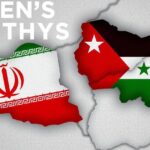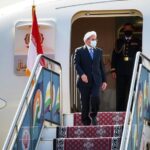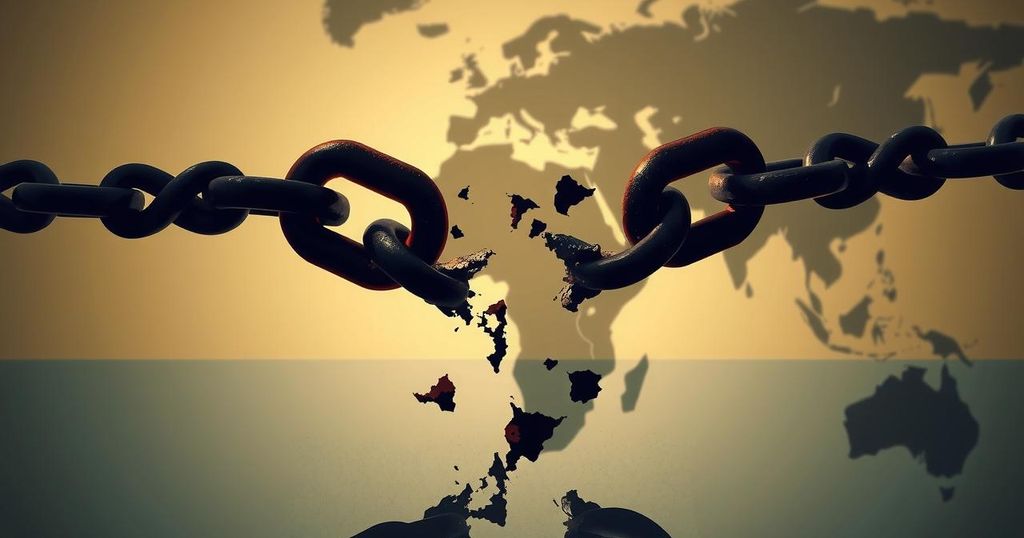Yemeni Government Urges West to Target Houthis Amid Iranian Weakness
Aidarus al-Zoubaidi, vice-president of the UN-backed Yemeni government, has urged Western nations to target the Houthi leadership, citing Iran’s weakened influence as a strategic opportunity. He proposed combined ground and air operations against the Houthis while criticizing previous military efforts as inadequate. Zoubaidi’s remarks indicate a shift away from peace diplomacy towards a more aggressive military stance, reflecting concerns over Iranian support for the Houthis.
The vice-president of the UN-backed Yemeni government in Aden, Aidarus al-Zoubaidi, has urged Western powers to seize the moment to strike against the Iran-backed Houthi leadership in Yemen, taking advantage of perceived Iranian weaknesses in Lebanon, Syria, and Gaza. Zoubaidi suggested that now is a crucial opportunity to counter the Houthis and indicated a potential collaboration between Yemeni ground forces and Western airstrikes as part of a comprehensive military strategy.
While addressing the World Economic Forum in Davos, Zoubaidi called for the new U.S. administration to label the Houthis as a foreign terrorist organization, praising former President Donald Trump for his decisive leadership. His comments signal that the Presidential Leadership Council, based in Aden, is considering a military offensive against the Houthis, potentially involving ground troops.
Zoubaidi acknowledged that despite Iran’s weakening position, the country is likely to continue its support for the Houthis, viewing them as a key component of its proxy forces. He emphasized the need for a coordinated military approach, stating that previous U.S. and U.K. strikes have been ineffective due to a lack of targeted action against Houthi leadership and strategic locations.
The U.S. military actions have primarily aimed to deter Houthi attacks on commercial shipping in the Red Sea, which the Houthis assert are acts of solidarity with Gaza. Abdul-Malik al-Houthi, the group’s leader, announced that during the Gaza ceasefire, Houthi forces would focus their attacks only on shipping linked to Israel.
Zoubaidi noted that the Houthi social support structure differs significantly from that of Hezbollah and Hamas, suggesting that merely targeting their leadership would not suffice for a successful military campaign. He criticized the Biden administration for its perceived lack of assertiveness, particularly regarding the decision to alter the designation of the Houthis, which he argued has provided them with increased operational space.
Zoubaidi’s statements reflect a growing skepticism towards the ongoing diplomatic roadmap for peace. As president of the Southern Transitional Council, which is supported by the United Arab Emirates, it remains uncertain whether his call for a more aggressive military strategy has the backing of Saudi Arabia or the current U.S. foreign policy team.
In recent years, the conflict in Yemen has centered around the Houthi movement, which has received backing from Iran. The ongoing violence has resulted in a humanitarian crisis in Yemen, prompting international calls for action. The Yemeni government, recognized by the international community, has struggled against the Houthis since they took control of the capital, Sana’a, in 2014. There have been various military and diplomatic efforts to reach a settlement, but outcomes remain contentious amid regional power dynamics.
In summary, Aidarus al-Zoubaidi advocates for a strategic offensive against the Houthis, leveraging Iran’s current vulnerabilities. His statements indicate a desire for collaboration with Western forces and a renewed emphasis on military tactics over diplomatic approaches. The future of Yemen remains uncertain as both internal and external factors continue to shape the conflict.
Original Source: www.theguardian.com








Post Comment